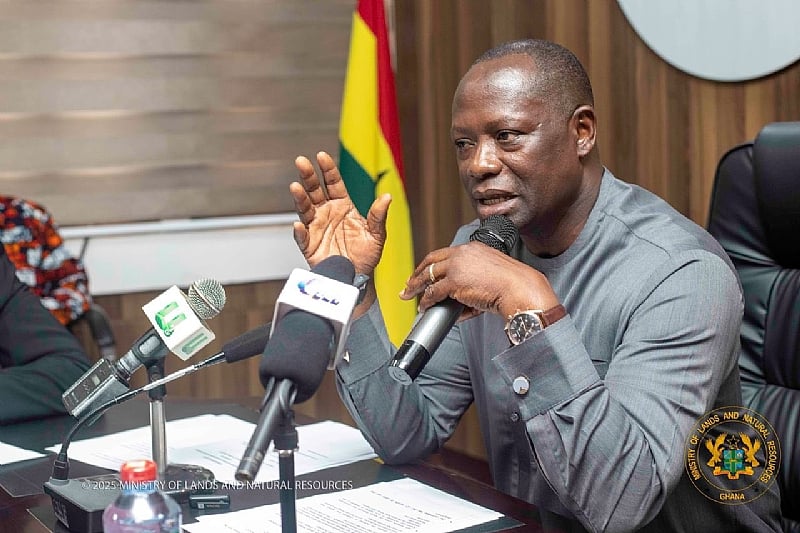The revocation of Akonta Mining Limited’s mining license by Ghana’s Minister for Lands and Natural Resources, Emmanuel Armah-Kofi Buah, has sparked a heated controversy, with the company vehemently denying allegations of illegal mining within the Tano Nimiri Forest Reserve. The Minister publicly accused Akonta Mining, owned by Bernard Antwi Boasiako, the Ashanti Regional Chairman of the ruling New Patriotic Party (NPP), of operating unlawfully within the protected forest area, specifically the Aboi and Tano Nimiri Forest Reserves in the Western North Region. The Minister’s accusations stem from alleged encroachment by the company into the reserves despite holding a valid license for operations outside these protected zones. This incident has unfolded against a backdrop of increasing national concern over the devastating environmental consequences of illegal mining, commonly known as “galamsey,” in Ghana.
Akonta Mining, in a strongly worded statement, refuted the Minister’s allegations as “false and misleading,” characterizing the license revocation as a breach of natural justice and a politically motivated act. The company insists it is not responsible for any mining activities within the Tano Nimiri Forest Reserve, placing the onus squarely on the Forestry Commission and the Ministry of Lands and Natural Resources. Akonta Mining argues that it has never been granted access to the said forest area and therefore cannot be held accountable for any illicit activities occurring there. The company expressed deep concern over what it perceives as an attempt by state institutions to shift blame, potentially for their own regulatory failures.
The core of Akonta Mining’s defense rests on the assertion that the Minister’s decision was taken without due process, lacking any formal investigation or hearing. This, the company argues, constitutes a clear violation of the principles of natural justice, implying a predetermined outcome driven by political considerations rather than objective evidence. The company’s statement also highlights the absence of any prior engagement or communication from the Ministry regarding the alleged illegal activities, further reinforcing their claim of unfair treatment. This lack of procedural fairness, according to Akonta Mining, casts doubt on the legitimacy of the Minister’s actions and raises questions about the government’s commitment to impartial enforcement of environmental regulations.
In an attempt to bolster its credibility and counter the damaging allegations, Akonta Mining has emphasized its commitment to operating within the bounds of the law and maintaining transparency in all its operations. The company has publicly declared its willingness to subject its documentation, permits, and official correspondence to public scrutiny, inviting independent verification of its compliance with existing regulations. This proactive approach aims to demonstrate the company’s commitment to responsible mining practices and environmental stewardship, contrasting sharply with the image portrayed by the Minister’s accusations. Akonta Mining’s insistence on transparency suggests a desire to dispel any perception of wrongdoing and rebuild public trust, which has been eroded by the widespread problem of illegal mining in the country.
The ongoing dispute between Akonta Mining and the Ministry of Lands and Natural Resources highlights the complex challenges surrounding mining regulation and environmental protection in Ghana. The case underscores the tension between economic development, represented by mining activities, and the preservation of fragile ecosystems, represented by forest reserves. The allegations against Akonta Mining, particularly the alleged encroachment into protected areas, raise serious concerns about the effectiveness of existing regulatory mechanisms in preventing illegal mining and protecting Ghana’s natural heritage. The company’s vehement denial and allegations of political motivation further complicate the situation, adding a layer of political intrigue to an already contentious issue.
This incident serves as a potent reminder of the urgent need for stronger enforcement of environmental regulations and greater transparency in the mining sector. The public outcry over illegal mining and its devastating impact on Ghana’s forests and water bodies demands decisive action from the government. The Akonta Mining case represents a critical test of the government’s commitment to addressing this pressing environmental challenge and upholding the rule of law in the face of powerful political and economic interests. The outcome of this dispute will likely have significant implications for the future of mining regulation and environmental protection in Ghana, setting a precedent for how similar cases are handled and potentially influencing the broader fight against illegal mining activities across the country.


